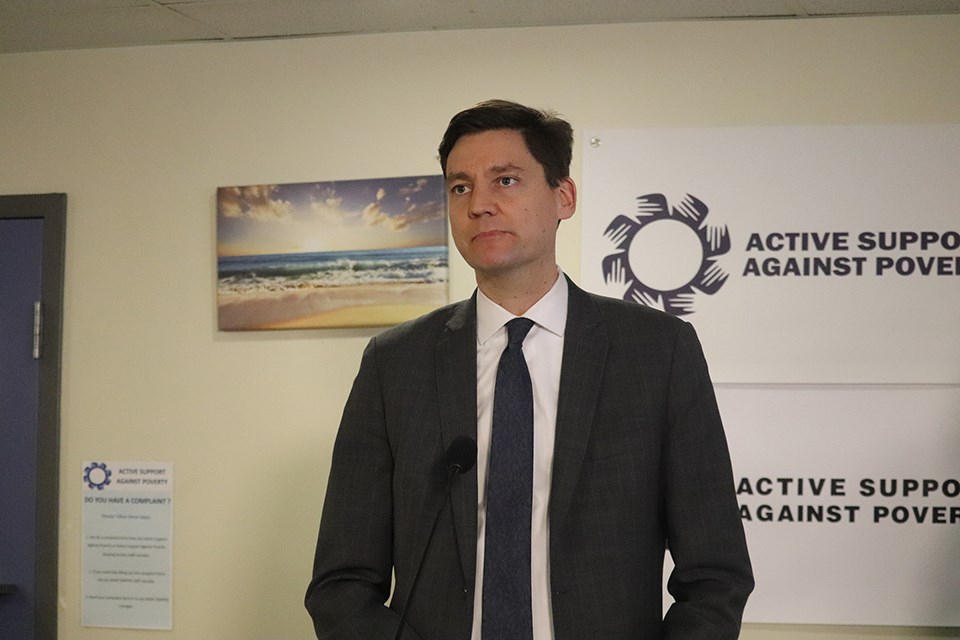Low-income individuals in Prince George now have access to free legal resources through a newly established legal clinic focusing on poverty law.
As part of continued efforts to enhance access to justice, the B.C. government has awarded a $250,000 grant to Active Support Against Poverty (ASAP) that allows the organization to host the legal clinic which began running in January.
“I’m firmly in the belief that all British Columbians deserve access to justice, in particular, there are a lot of very vulnerable people in our communities that haven’t had access to basic legal resources to assist them through what can be a really complicated process that can have really grave implications for our lives,” said Attorney General David Eby during an announcement made at ASAP today (March 10).
The new funding has enabled ASAP to hire a lawyer and trained legal staff who can offer legal advice and act as counsel in proceedings.
The clinic won’t be handling criminal law cases, but focusing on matters related to poverty law including tenants’ rights, pension, welfare, employment insurance, and worker’s compensation.
“In Canada, you have certain constitutional rights to have a lawyer represent you on certain matters, so if you are facing a criminal charge,” said Eby, explaining there are certain circumstances where B.C. has to provide individuals with lawyer.
He says the legal clinic provides services on top of those constitutional rights to individuals who would not otherwise be able to afford a lawyer.
“You don’t have a constitutional right to a lawyer if you are going to lose your home if you are not getting the employment assistance that you are entitled to.”
The legal clinic has already assisted roughly 18 clients, including Amber Mueller.
She was the clinic's first client and accessed its services when she was going through a dispute with her landlord.
“I didn’t have the money for a new place and I didn’t know where I could turn to for myself and my kids,” she said, with the clinic’s help, she was able to get a stay for a writ of possession, which allowed her time to find a new place to live.
“Now I am in a good place and have a new home and my kids are really enjoying it and it’s worked out with us. I have already and I will continue to point people in this direction, it is something that is needed in town and I was thankful I got the help that I did.”
Josh Patterson, Executive Director of Law Foundation of B.C., explained how important it is for individuals to have access to legal clinics.
“Legal clinics are places that people come to often at the worst moment of their lives. They’ve been treated unfairly, maybe, by a landlord and they are at risk of losing their home,” says Patterson.
“If you can stop some of those initial bad things from happening in a chain, or one piece of someone’s life that’s not going well and is complicated — in a life that is already very difficult and full of challenges — you can stop so many different other things down the line from going wrong in other cases.”
He says while the foundation has been providing legal advocacy services for years around the province, these new legal clinics are adding lawyers on top of the already existing non-lawyer advocates which will allow them to actually go to court and appeal.
There are currently six legal clinics operating or about to open within the province including four specializing in poverty law. One in Prince George and the others in Kamloops, Kelowna and Surrey.
ASAP Executive Director Audrey Schwartz says anyone who needs the service is welcome to apply, however, there is a needs assessment intake process that will look at income, assets and the particular legal issue.
“Active Support Against Poverty has been providing legal advocacy in limited areas to people who are low income. The poverty legal clinic gives us the opportunity to expand that,” says Schwartz.
“As Amber’s story has demonstrated we now have a lawyer that can appeal and go to supreme court to assist people who have very egregious legal issues get some resolution.”
Eby says the Law Foundation will be tracking the cases and outcomes in order to advocate for continued funding.
“Our hope is that these programs will be very successful and we will be able to demonstrate this is a good investment of public money in terms of preventing homelessness and other negative outcomes that cost a lot more than providing interventions at the right moment for people.”



